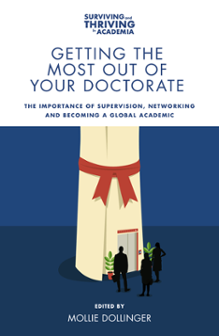
Index
Getting the Most Out of Your Doctorate
ISBN: 978-1-78769-908-3, eISBN: 978-1-78769-905-2
Publication date: 24 April 2019
Citation
(2019), "Index", Dollinger, M. (Ed.) Getting the Most Out of Your Doctorate (Surviving and Thriving in Academia), Emerald Publishing Limited, Leeds, pp. 141-147. https://doi.org/10.1108/978-1-78769-905-220191002
Publisher
:Emerald Publishing Limited
Copyright © 2019, Editorial matter and selection the Editor, individual chapters the respective Author/s
INDEX
- Prelims
- Part I Preparation
- Chapter 1 Selecting a Supervisor
- Chapter 2 Setting and Adjusting Expectations of Supervision
- Chapter 3 When the Advisor Is Not Enough
- Part II Mediating
- Chapter 4 Navigating Co-supervision
- Chapter 5 The Power of an Effective Community in Creating Networked Researchers: Outcomes beyond a Thesis
- Chapter 6 Developing Networks Near and Far
- Part III Understanding Your Place
- Chapter 7 Aligning Yourself to Internationalization
- Chapter 8 Succeeding beyond Your Doctorate: The Importance of Identity, Industry Awareness, and Decisive Action
- Chapter 9 Guidance for the Modern PhD Candidate
- Index